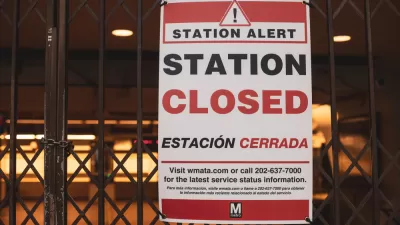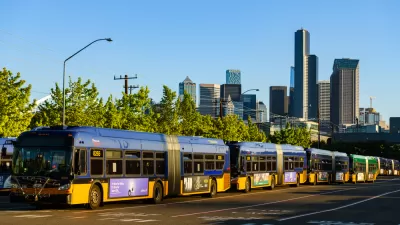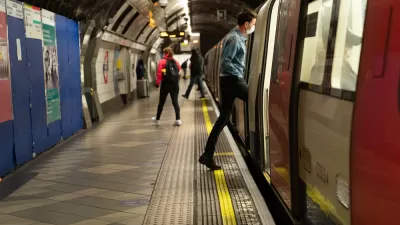The realities of the coronavirus are most obvious in the declining ridership, and revenues, on public transit in the United States, but it's not enough to shut down public transit when so many people depend on safe, healthy service.

TransitCenter has produced analysis about the ongoing effects of the coronavirus on public transit in the United States, producing a jaw-dropping estimate for the amount of money transit agencies will come fall short of expected revenue for the year given the reduced number of riders on public transit—despite the critical role of public transit in the public health crisis.
Among the millions of people still relying on public transit, according to the post, are "Health care workers going to and from their shifts; cleaners, warehouse staff, and food workers reporting to their jobs; utility employees; heads of household making trips to grocery stores and pharmacies."
The need for continued public transit service is challenged by the risk of close proximity among infected people. Cutting service or shutting down operations isn't an option: "Public transit agencies cannot weather this crisis through cuts. In order to maintain proper social distancing, transit agencies must operate enough service so that riders are not subject to crowded vehicles."
In that context, TransitCenter for the first time estimates the amount of revenue transit agencies are likely to miss out on in 2020, coming up with two figures: $26 billion or $38 billion. So far in the developing crisis, numerous transit agencies have made specific requests to Congress for more than $1 billion in emergency relief, and the American Public Transit Association (APTA) made a request for $12.9 billion in relief from the federal government, as reported by Planetizen last week.
The TransitCenter analysis also provides "snapshots of current impacts on local agencies" and "two scenarios outlining the potential cumulative impact on transit agencies nationwide." Those two scenarios represent the low- and the high-end estimates at either side of the $26 billion and $38 billion figures mentioned above.
FULL STORY: Estimated Financial Impact of COVID-19 on U.S. Transit Agencies: $26-$38 Billion Annually

Alabama: Trump Terminates Settlements for Black Communities Harmed By Raw Sewage
Trump deemed the landmark civil rights agreement “illegal DEI and environmental justice policy.”

Study: Maui’s Plan to Convert Vacation Rentals to Long-Term Housing Could Cause Nearly $1 Billion Economic Loss
The plan would reduce visitor accommodation by 25% resulting in 1,900 jobs lost.

Planetizen Federal Action Tracker
A weekly monitor of how Trump’s orders and actions are impacting planners and planning in America.

Wind Energy on the Rise Despite Federal Policy Reversal
The Trump administration is revoking federal support for renewable energy, but demand for new projects continues unabated.

Passengers Flock to Caltrain After Electrification
The new electric trains are running faster and more reliably, leading to strong ridership growth on the Bay Area rail system.

Texas Churches Rally Behind ‘Yes in God’s Back Yard’ Legislation
Religious leaders want the state to reduce zoning regulations to streamline leasing church-owned land to housing developers.
Urban Design for Planners 1: Software Tools
This six-course series explores essential urban design concepts using open source software and equips planners with the tools they need to participate fully in the urban design process.
Planning for Universal Design
Learn the tools for implementing Universal Design in planning regulations.
Caltrans
Smith Gee Studio
Institute for Housing and Urban Development Studies (IHS)
City of Grandview
Harvard GSD Executive Education
Toledo-Lucas County Plan Commissions
Salt Lake City
NYU Wagner Graduate School of Public Service





























